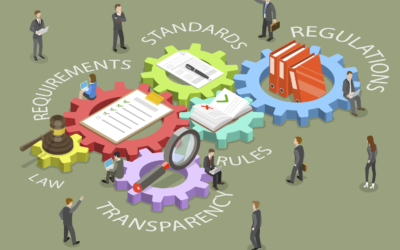
We live in an age of increasing centralization that pervades all aspects of our culture. In today’s world, centralization equates to control; centralization equates to power. Centralization gave rise to bureaucratic institutions where decisions, borne by a few, ran through a hierarchical structure. This ensured a system where one authority determined how systems were run and how objectives were met. This is symbolic of how authoritarian governments operate. These governments have unlimited power but their effective size is much smaller, run by one or a few persons who impose order. If a constitution does exist within this type of system, it is essentially ignored if it promotes limiting powers of the state versus giving more voice to the people. Although leaders in many of these states are elected, this is wrapped in a shroud of whitewash where leaders do not govern based on the consent of the people.
Originally free societies evolved within a decentralized system, as exemplified by many of western economies. There were checks and balances based on a distributed system designed to serve the interests of the people and provide its citizens with the services they need. This kept society functioning. There are, however, aspects of western economies that have become increasingly centralized. Central banks have been given responsibility as the lender to the government to ensure price stability through monetary policy, but in effect have achieved the opposite. One of their functions, for example, printing money, flows initially to the powerful, and by the time it reaches the pocketbooks of the people, it has inflated the cost of goods, thus widening the gap between the rich and poor. Banks, trusts and credit issuers function within a centralized financial system that controls the flow of money designed to mitigate fraud, so processes are implemented to censor transactions and mandate their flow through centralized systems to maintain this control. A functioning society built on meeting the needs of its inhabitants has bequeathed these institutions with certain powers formed from a foundation of trust.
The stability and reliance on these systems created an ever increasing dependency in the process, and unwitting public trust. But what happens when that stable backbone is challenged? What happens when the confidence evolves into questioning the very systems that we’ve come to depend on. The way it’s always been done has become a challenging hurdle that we revisit time and time again, with no immediate solution in our midst. It’s this statement that has stifled organizations from progressing in lock-step with new market demands, and has provided erroneous justification for their own inaction in the process.
The direction of technology today also reflects this underlying cultural zeitgeist. Is it just coincidence that the original internet which was actually designed and developed as a decentralized system morphed into a bastion of centralized power? What Tim Berners-Lee envisioned for the world wide web did not come to fruition:
The increasing centralization of the Web has ended up producing—with no deliberate action of the people who designed the platform—a large-scale emergent phenomenon which is anti-human.
Function always follows form and, as a result, has given rise to accumulation of power by the relatively few in both governments and corporations at the expense of the many. As a consequence, we see more centralized storage of personal data and the resulting repercussions of hacking, identity theft, privacy infringement and behavioral profiling. While the newness of technology and the abundance of opportunities has stimulated more innovation, the same environment has also exposed vulnerabilities of government surveillance, opportunism and immoral profiteering.
In the business sector, the value of data, over time, has brought institutions to a cross-roads. The rationalization to build products and services that people will buy has produced an environment demanding increased contextualization to understanding user behavior, and now, predicting what consumers will do if presented with options. A/B testing has been an age-old method that has allowed business to develop scenarios to determine behavior if a variable was removed or modified. It allowed marketers to understand across small sample sizes whether a targeted group would be more susceptible to responding to one offer or another. If within the smaller sample size one offer proved to be more viable given a strong confidence level, then that would be rolled out to the rest of the population. Enter machine learning. Today, A/B testing has been super-charged to allow multitudes of testing on offers, communications, and channels but now overlaid against profile variables including purchase propensity, location, demographics, wealth and political affiliation, to name a few. The Facebook/Cambridge Analytica scandal exemplified the extent to which user information was used.
Facebook is analogous to a central authority. Unlike Berners-Lee’s vision of a decentralized internet that creates a plethora of opportunities for the web and its inhabitants, Facebook has been able to garner over half of the global users. The ease of user experience, the addictive nature of its platform, and Facebook’s unbridled influence have made it difficult for new entrants to capture a piece of the social networking market dominated by Zuckerberg. This once-exciting idea of global community has seen its day. It has inflicted pain from online bullying, mounting mental anguish and has given rise to the unfettered voices that have transformed a web from social discourse to social anxiety.
Like governments, over time, the Facebook user has come to rely on the platform to maintain their connections with people they care about, and to stay up to date on the things that matter to them. But if the experience begins to degrade and the user starts questioning the very platform that has become its second home then what? Reliance and trust are two sides of the same coin. And if one fails, so does the other. And if both fail, the user is left with few alternatives. What makes this more disturbing is the hold that these central authorities have on users. The thought of leaving a community that took time to nurture and grow – to start anew elsewhere, is unfathomable. Banks have the same philosophy when acquiring customers: if they could target young people to set up bank accounts, the more difficult it would be for the youth to leave over time. The banks would create an experience so enticing, the user would be compelled to get all their loans, mortgages and investments in one place just because it’s ‘easier’. We, as a society, have fallen into the trap of trusting central authorities, and forgiving their misdeeds, because we either believe that they inherently care about us or cynically, we acquiesce to the devil we know. But most importantly, there are, as yet, few alternatives.
If the risk of personal data is exposed, or mined in ways that ultimately inflict undue harm on people, then we ultimately look to our lawmakers and resulting regulation to right these wrongs. What is evolving, however, is a society that leaves us to question the intentions of governments and pseudo-capitalist corporations, as the role of data becomes increasingly significant. From Aadhar, the largest biometric database in the world, and an initiative by India to know its citizens, to the Social Credit system instituted by China to create a more trusted society, western society is beginning to witness snippets of these behaviours closer to home. From Amazon Ring’s intrusive tracking of innocent citizens cloaked in messaging promoting “Complete peace of mind” , to NYC Mayor Bill DeBlasio’s attempt to issue IDNYC Smart cards, potentially exposing people to serious risks “including dangerous experimentation or misuse by current/future administrations …”–the price of progress using the centralized model is failing us.
When our trust in central authorities fail, where do we look for solutions? If data has its weight in gold and that will not change anytime soon, then perhaps it’s time to deviate from the way things have been to areas where we can reclaim some semblance of control before it’s too late.
Alex Goldstein in his presentation about freedom and technology, states we are at a critical time in history where governments and corporations own our information. This will eventually lead to a society of surveillance and censorship. The alternative is decentralization.
The term decentralization has been equated with the dark web, crypto currency, blockchain — the edges of the web where mainstream has yet to set foot. In reality, decentralization is anti-authoritarian in nature. Decentralization is a concept of shared accountability, shared consensus and the removal of third parties that get in the way of transactions or communications. Decentralization belies censorship by any one entity. Decentralization becomes a crucial component to preserving our privacy and freedom.
In this example, Goldstein references a trusted centralized authority, VISA and compares it to Bitcoin, “a dynamic censorship-resistant payment network”. VISA is a trusted global payment processor, which manages over 2000 transactions per second, each entirely censorable. In order to mitigate fraud these payment processors require centralization of all transactions. The linear systems require enormous investment in data centres that have the capacity to process and store the data. As transactions increase so do the need for more processing power and storage. How fortuitous that an entity naming themselves Satoshi Nakamoto introduced Bitcoin in 2008, at the height of the Mortgage Crisis. Compared to VISA, Bitcoin, in its nascency, manages 10 transactions per second. While the volume disparity is significant, the difference is each Bitcoin transaction requires no middle man. They’re unstoppable. Bitcoin offers a peer to peer solution that allow users to easily join as nodes in the network. While the processing time is slower, in comparison, through a consensus mechanism, and a community-powered network, transactions are trusted with no need for a central bank. The potential for Bitcoin and cryptocurrency persist as centralized systems become more susceptible to data vulnerabilities. As well, in developing economies where payment systems like Paypal are unavailable, the rise of cryptocurrency has been the viable alternative.
How we treat data today will determine humanity’s fate. Yuval Noah Harari, author of Sapiens states,
If you dislike the idea of living in a digital dictatorship then the most important contribution you can make is to find ways to prevent too much data from being concentrated in too few hands. These will not be easy tasks but achieving them may be the safeguard of democracy.
When citizens are incentivised to use technology to keep them safe, but instead realize they are feeding into a system of intrusive tracking and data manipulation, trust begins to weaken. Facebook, Twitter and Youtube have become judge and jury to the issues of free speech that continue to taint their platforms. Governments continue to be a lagging remedy to these issues, and yet are far from innocent in their unabated thirst for more data.
As technology progresses, and more vulnerabilities arise within our once-trusted system, we need to redefine how data is used through increased transparency. We also need to rethink the systems that use the data that benefit others and not the users who created them. People need to reclaim their information. This is a significant shift in data control and consent that central authorities are hesitant to surrender because it threatens their age-old profitable business model – but it will be fundamental to positive change. Finally, the general public needs to be informed, more educated, and actively vigilant about the use of their information.
The systems that have prevailed in the past are not working. They have not served their citizens well. We have lost trust in these systems. If we are to create a future free of censorship and surveillance, we have a massive undertaking that awaits us. I have always believed that the function of society was to set up the necessary systems to help individuals live good lives where they have an opportunity to achieve their dreams. This has been achieved through centralized solutions. However, recent evidence dictates that while we still depend on central solution for a few functions, we must look beyond our current infrastructure and archaic ways of thinking to outsource the development of most societal-benefiting solutions to young, radical-thinkers – entrepreneurs already pursuing decentralized options.
If we do my belief is that humanity will always wins out.
This article originally appeared on Forbes






